Product Managers are the backbone of successful product development. They bridge the gap between business strategy and technical execution, ensuring that products meet market needs and drive company growth. However, many companies struggle to find the right fit, often overlooking key attributes or focusing too heavily on technical skills at the expense of leadership and communication abilities.
This comprehensive guide will walk you through the process of hiring a top-notch Product Manager. We'll cover everything from crafting an effective job description to conducting insightful interviews. For a deeper dive into the skills required for this role, check out our detailed breakdown of Product Manager skills.
Table of contents
Why hire a Product Manager?
To decide if you need a Product Manager, start by identifying key business challenges or opportunities. For instance, you might be struggling with product-market fit, user engagement, or feature prioritization. A Product Manager can help address these issues and drive product success.
Consider hiring a Product Manager when:
- Your product development process lacks direction or strategy
- There's a disconnect between customer needs and product features
- You need someone to lead cross-functional teams and align stakeholders
If you're unsure about committing to a full-time hire, consider starting with a product management consultant. This approach allows you to test the waters and evaluate the impact before building an in-house product management team.
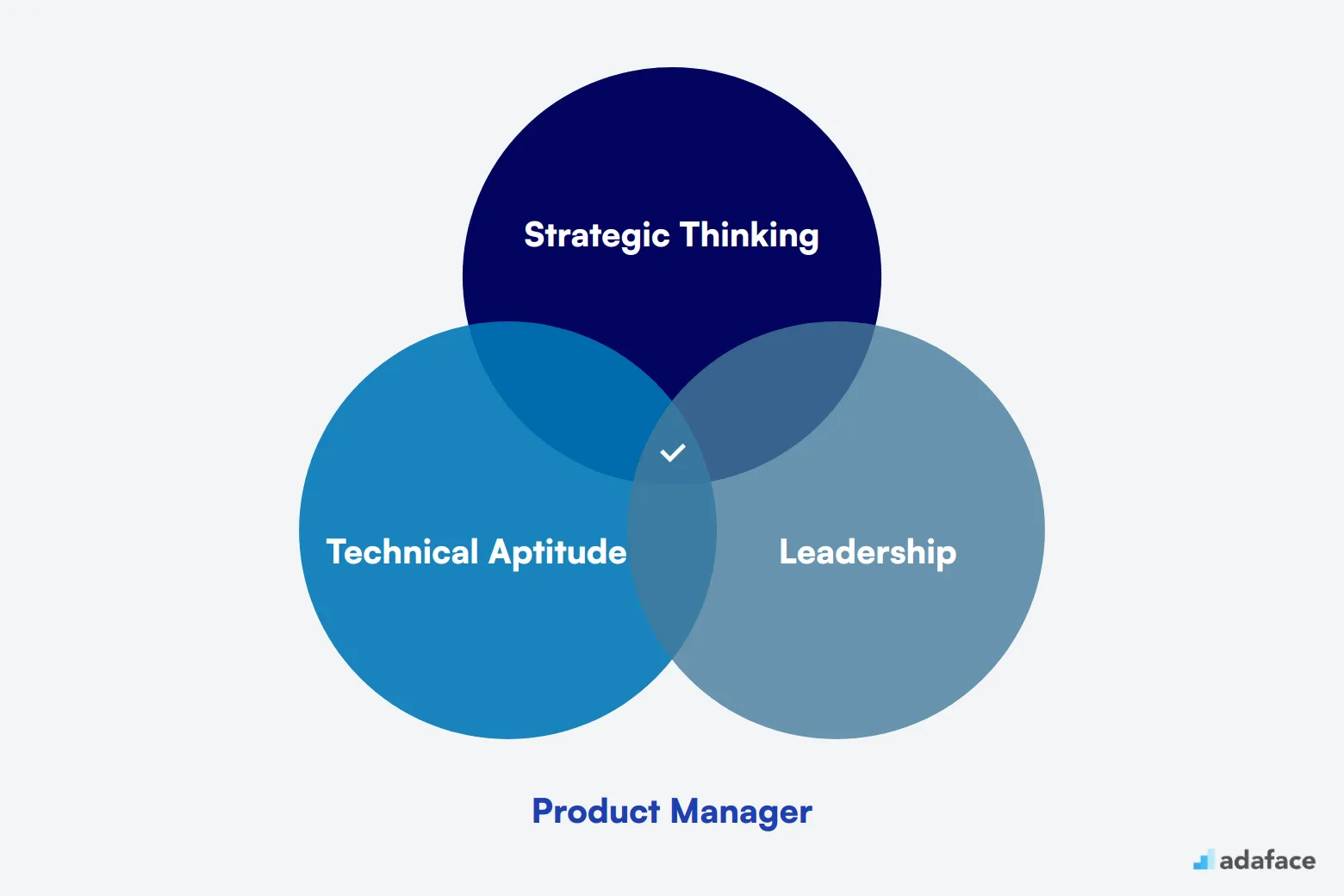
Skills and Qualifications to Look for in a Product Manager
Creating a candidate profile for a Product Manager can be tricky. Different companies have different needs, making it important to distinguish between what's required and what's preferred. For instance, while experience with Agile methodologies might be necessary for your team, knowledge of UX/UI design principles might be just a preference.
When considering candidates, it's important to clearly define the required skills and qualifications. A Bachelor's degree in Business, Computer Science, or a related field along with 3+ years of experience in product management are foundational. Key skills include analytical problem-solving and excellent communication.
On the other hand, preferred qualifications can help you identify a standout candidate. An MBA or experience in the tech industry can be a plus. Familiarity with data analysis tools and cross-functional team leadership is beneficial. For more insights on crafting an effective hiring process, you might find this hiring process guide useful.
| Required skills and qualifications | Preferred skills and qualifications |
|---|---|
| Bachelor's degree in Business, Computer Science, or related field | MBA or advanced degree |
| 3+ years of experience in product management | Experience in the tech industry |
| Strong analytical and problem-solving skills | Knowledge of UX/UI design principles |
| Excellent communication and presentation abilities | Familiarity with data analysis tools |
| Experience with Agile methodologies | Experience with cross-functional team leadership |
How to write a Product Manager job description?
Crafting a compelling Product Manager job description is key to attracting the right talent. Once you have a candidate profile ready, the next step is to capture that information to draw in suitable candidates.
- Highlight the role's responsibilities and impact: Clearly define what the Product Manager will contribute to your organization. Emphasize how their work connects to your business goals and makes a difference.
- Balance technical skills with soft skills: While listing necessary proficiencies, such as experience with product lifecycle management or familiarity with certain methodologies, also mention qualities like leadership and communication. This attracts well-rounded candidates.
- Showcase the company's unique attributes: Describe what makes your company and the position attractive. Whether it's innovative projects, career progression opportunities, or a collaborative culture, these details can set your listing apart. For more guidance, refer to product manager job description.
Top Platforms to Source Product Managers
Now that you have a well-crafted job description, it's time to list your product manager role on job platforms to attract qualified candidates. The right platform can significantly boost your chances of finding the perfect fit for your team.
LinkedIn Jobs
Ideal for posting full-time product manager positions and reaching a wide network of professionals. Allows for detailed job descriptions and easy application process.

Indeed
Versatile platform suitable for posting various types of product manager roles. Offers a large candidate pool and resume database for efficient hiring.

Glassdoor for Employers
Excellent for employer branding and attracting informed candidates. Provides a platform to showcase company culture and benefits alongside job listings.
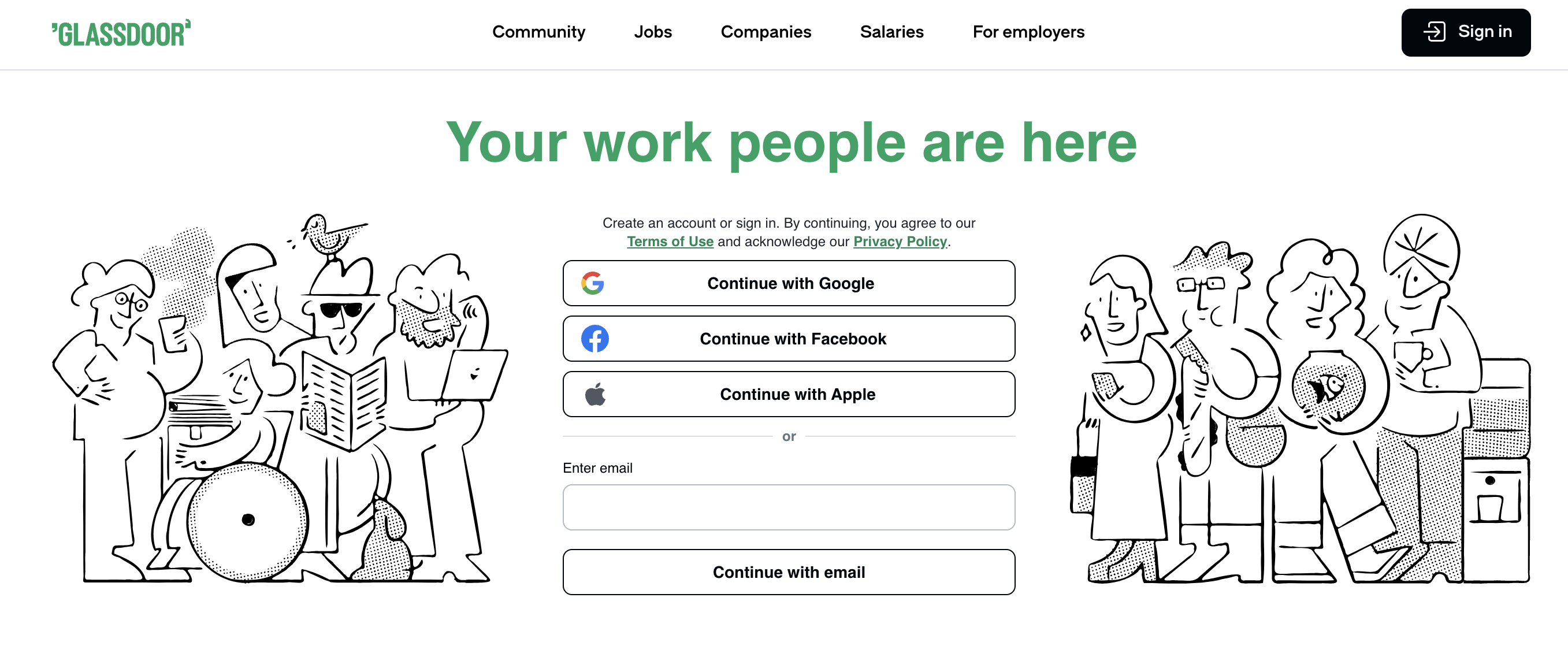
Other notable platforms include We Work Remotely for remote positions, Product Manager Jobs for niche listings, FlexJobs for flexible arrangements, and Crunchboard for tech startups. Each platform caters to specific hiring needs, helping you target the right talent pool for your product manager role. Consider your company's unique requirements when choosing where to post your job listing.
How to Screen Product Manager Resumes
Screening resumes is important to identify qualified candidates while saving time. With the vast number of applicants for a Product Manager position, filtering resumes helps streamline the hiring process by focusing on the most promising candidates.
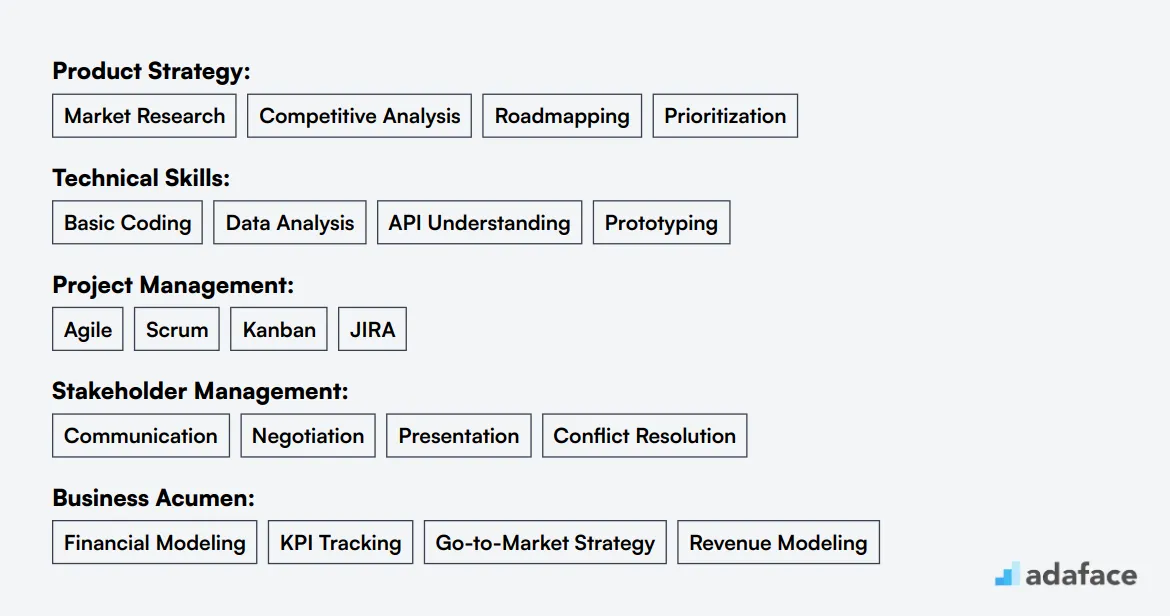
When manually screening resumes, look for keywords that match the required skills and qualifications. For a Product Manager, these may include strategic thinking, technical aptitude, and leadership. Check for relevant experience, such as experience in product management and familiarity with Agile methodologies. Refer to the product manager job description to ensure alignment.
Utilizing AI-powered tools like language models can simplify the process further. These tools can help you quickly screen through piles of resumes by identifying relevant keywords and providing a shortlist of suitable candidates. They can effectively score and recommend candidates based on the predefined criteria.
Below is an AI prompt example you might use to improve your screening process:
INPUT: Resumes
OUTPUT: For each resume, provide following information:
- Email id
- Name
- Matching keywords
- Score (out of 10 based on keywords matched)
- Recommendation (detailed recommendation of whether to shortlist this candidate or not)
- Shortlist (Yes, No or Maybe)
RULES:
- If you are unsure about a candidate's fit, put the candidate as Maybe instead of No
- Keep recommendation crisp and to the point.
KEYWORDS DATA:
- Product Strategy (Market Research, Competitive Analysis)
- Technical Skills (Data Analysis, API Understanding)
- Project Management (Agile, JIRA)
- Stakeholder Management (Communication, Negotiation)
Consider using online assessment platforms for further evaluations of shortlisted candidates.
Which skills tests should you use to assess Product Managers?
Skills tests are a great way to evaluate Product Manager candidates objectively. They help you assess practical abilities beyond what's on a resume. Let's look at some key tests for Product Managers.
Product Manager Assessment Test: This comprehensive test evaluates a candidate's ability to define product strategy, prioritize features, and manage the product lifecycle. It's ideal for assessing overall product management skills.
Business Analyst Test: Product Managers often need strong analytical skills. A Business Analyst test can help gauge a candidate's ability to analyze data, identify trends, and make data-driven decisions.
Project Management Test: Successful Product Managers need to coordinate multiple tasks and teams. A Project Management test assesses a candidate's ability to plan, execute, and monitor projects effectively.
Technical Aptitude Test: While not all Product Manager roles require deep technical knowledge, a basic understanding is often beneficial. A Technical Aptitude test can help evaluate a candidate's technical foundation.
Cognitive Ability Tests: Product management requires quick thinking and problem-solving. Cognitive ability tests can help assess a candidate's reasoning skills and ability to handle complex information.
Case study assignments to hire Product Managers
Case study assignments are a popular tool for evaluating Product Manager candidates, providing insights into their analytical skills and approach to problem-solving. However, these assignments can be lengthy and demanding, which may result in lower completion rates and the risk of losing talented candidates. For this reason, it's crucial to choose assignments that are engaging and relevant to the role. Below are three recommended case studies that effectively assess a candidate's capabilities.
Market Analysis Case Study: This assignment requires candidates to analyze a specific market, identify trends, and recommend strategies for market entry or growth. It tests their understanding of market dynamics and ability to make data-driven decisions. This is particularly useful for assessing candidates' analytical and strategic thinking, as highlighted in the product manager interview questions blog.
Product Launch Strategy Case Study: Candidates are tasked with developing a comprehensive plan for launching a new product. This case study evaluates their ability to coordinate cross-functional teams, foresee potential challenges, and create impactful marketing strategies. It gives insights into their planning and execution skills, aligning with the skills required for a Product Manager.
User Experience Improvement Case Study: In this assignment, candidates propose enhancements for a product's user interface or experience based on provided data or user feedback. This tests their empathy towards users, creativity, and problem-solving abilities. Such assessments are crucial for roles that focus on product design and user experience.
Structuring the Interview Process for Product Manager Candidates
After candidates pass the initial skills tests, it's time for technical interviews to assess their hard skills more thoroughly. While skills tests are great for initial filtering, technical interviews are key to finding the best fit for your Product Manager role. Let's look at some sample interview questions to help you evaluate candidates effectively.
Consider asking: 'How would you prioritize features for a new product?' This tests their decision-making skills. 'Can you walk us through a product launch you've managed?' assesses their experience and process knowledge. 'How do you gather and incorporate user feedback?' evaluates their user-centric approach. 'What metrics would you use to measure a product's success?' checks their analytical abilities. 'How do you handle conflicts between teams during product development?' examines their leadership and communication skills.
How much does it cost to hire a Product Manager?
Hiring a Product Manager can significantly impact your budget, with salaries varying by location and experience. In the United States, the average salary is about $129,914 per year, ranging from $74,774 to $195,971. Locations like Seattle and New York offer salaries above the national average, with Seattle at $138,141. Meanwhile, in Australia, salaries can range widely, with cities like Canberra offering up to AUD 300,000. These figures emphasize the importance of considering local market conditions when planning your hiring strategy.
Product Manager Salary in the United States
The average salary for a Product Manager in the United States is approximately $129,914 per year. Salaries can range from a low of $74,774 to a high of $195,971, depending on factors such as location and experience.
For example, in major cities, the median salary is as follows:
- Seattle, WA: $138,141
- New York, NY: $134,016
- San Francisco, CA: typically higher than the national average.
Understanding these figures can help recruiters offer competitive packages that attract top talent.
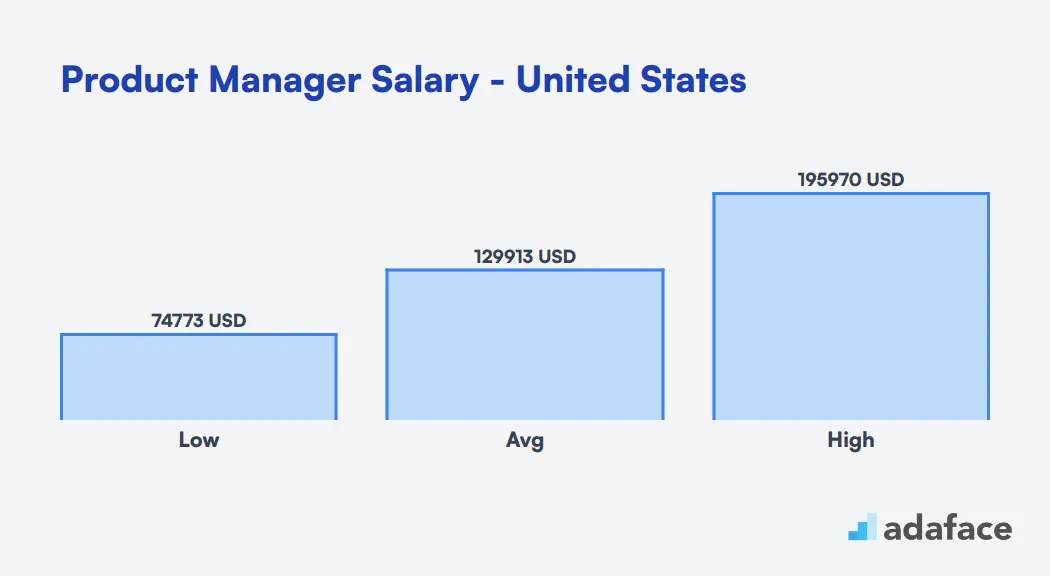
Product Manager Salary in Australia
In Australia, Product Manager salaries vary significantly depending on the location. In Canberra, salaries range from approximately AUD 216,380 to AUD 300,000, with a median of around AUD 315,553. Sydney sees salaries from AUD 92,442 to AUD 176,485, with a median of AUD 127,729. Across the country, the average salary is about AUD 128,377, with the lowest around AUD 90,004 and the highest reaching AUD 171,820.
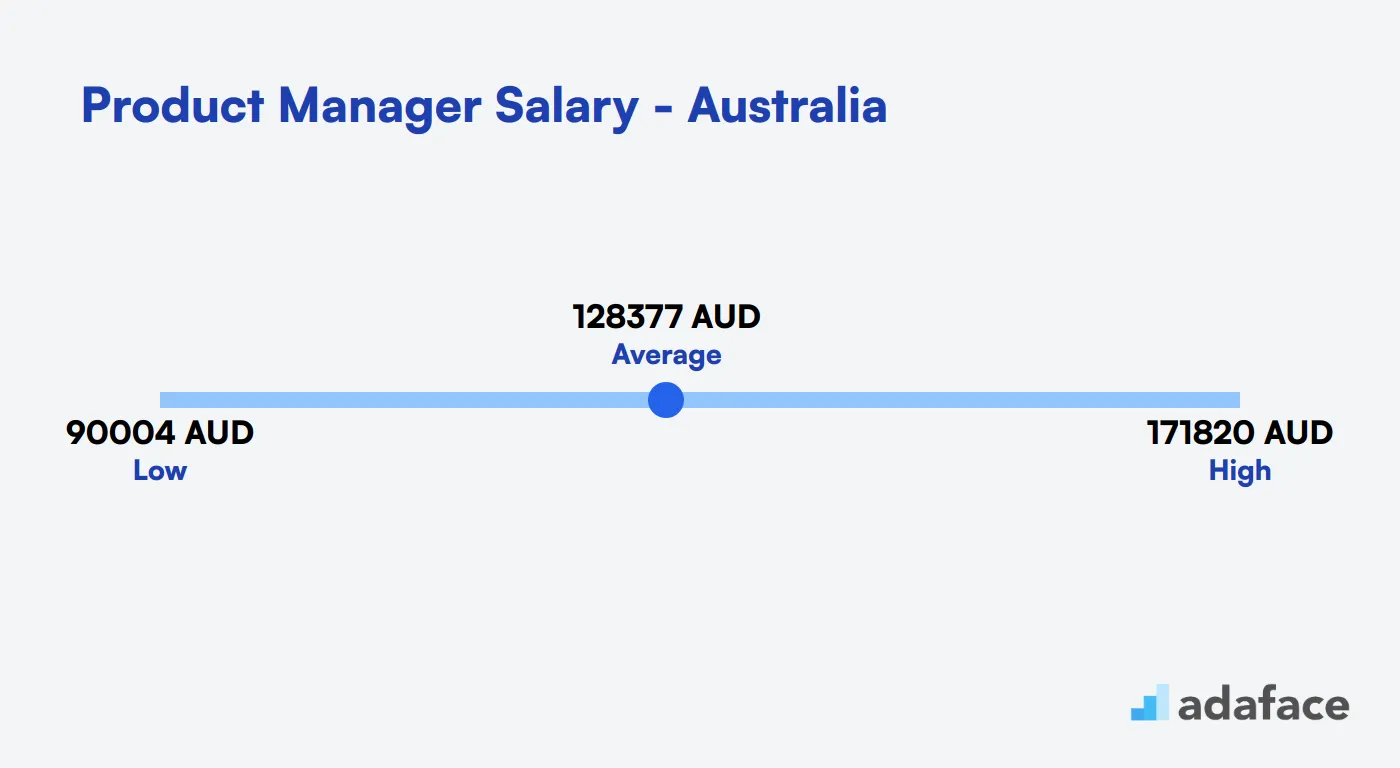
What's the difference between a Product Manager and a Product Owner?
Many people often confuse Product Managers and Product Owners because both roles focus on product development and work closely with teams to deliver value. Despite their overlap, these positions have key differences in their scope and responsibilities.
A Product Manager is typically responsible for the long-term vision and strategy of a product. They work with multiple teams across the organization to conduct market research, create roadmaps, and prioritize features. Product Managers engage extensively with stakeholders, including executives and customers, and focus on strategic product decisions and business KPIs.
In contrast, a Product Owner is more involved in the short-term aspects of product development, like sprint planning and execution. They interact mainly with the development team, manage the product backlog, and create user stories. With a deeper technical involvement, Product Owners focus on tactical decisions at the sprint level and monitor metrics related to team productivity. Their background often comes from development or project management.
For a deeper understanding of the skills required for a Product Manager, you can explore our detailed guide.
| Product Manager | Product Owner | |
|---|---|---|
| Strategic Focus | Long-term product vision and strategy | Short-term sprint planning and execution |
| Team Interaction | Works with multiple teams | Primarily interacts with development team |
| Responsibilities | Market research, roadmapping, prioritization | Backlog management, user story creation |
| Stakeholder Management | Extensive, including executives and customers | Limited, mainly development team and stakeholders |
| Technical Knowledge | Broad understanding | Deeper technical involvement |
| Decision Making | Strategic product decisions | Tactical sprint-level decisions |
| Metrics Focus | Business KPIs and product success | Sprint velocity and team productivity |
| Typical Background | Business, Marketing, or Technical | Often from development or project management |
Hire the Best Product Managers for Your Team
Throughout this blog post, we've explored the various facets of hiring a Product Manager, from understanding their role and crafting effective job descriptions to identifying essential skills and structuring interview processes. We've also discussed the differences between Product Managers and Product Owners to ensure you're targeting the right talent.
If there's one key takeaway, it's that using accurate job descriptions coupled with targeted skills tests is critical for hiring success. Implementing assessments like the Product Manager Assessment Test can help you evaluate candidates more accurately and find the best fit for your organization. By focusing on these elements, you can streamline your hiring process and build a strong product team.
Product Manager Online Test
FAQs
Key skills for a Product Manager include strategic thinking, user empathy, data analysis, communication, leadership, and technical aptitude. Our Product Manager Assessment Test can help evaluate these skills objectively.
An effective job description should clearly outline responsibilities, required skills, and qualifications. It should also highlight your company's product vision and culture. For a template, visit our Product Manager Job Description page.
LinkedIn, product management-specific job boards, professional networks, and referrals are excellent sources. Additionally, consider attending product management conferences and meetups to network with potential candidates.
A typical process includes resume screening, a phone interview, skills assessment, case study or product challenge, and in-person interviews with team members and stakeholders. Our Product Manager Interview Questions guide can help you prepare.
Effective assignments include product critique, feature prioritization exercises, mock product roadmap creation, or solving a specific product challenge your company faces. These should assess both strategic thinking and practical application of product management skills.
Use behavioral interview questions to understand their work style, collaboration skills, and problem-solving approach. Also, involve team members in the interview process to gauge how well the candidate would integrate with your existing team dynamics.
While there's some overlap, Product Managers typically focus on overall strategy and vision, while Product Owners are more involved in day-to-day execution, especially in Agile environments. Our Product Owner Job Description highlights these differences.

40 min skill tests.
No trick questions.
Accurate shortlisting.
We make it easy for you to find the best candidates in your pipeline with a 40 min skills test.
Try for freeRelated posts
Free resources



